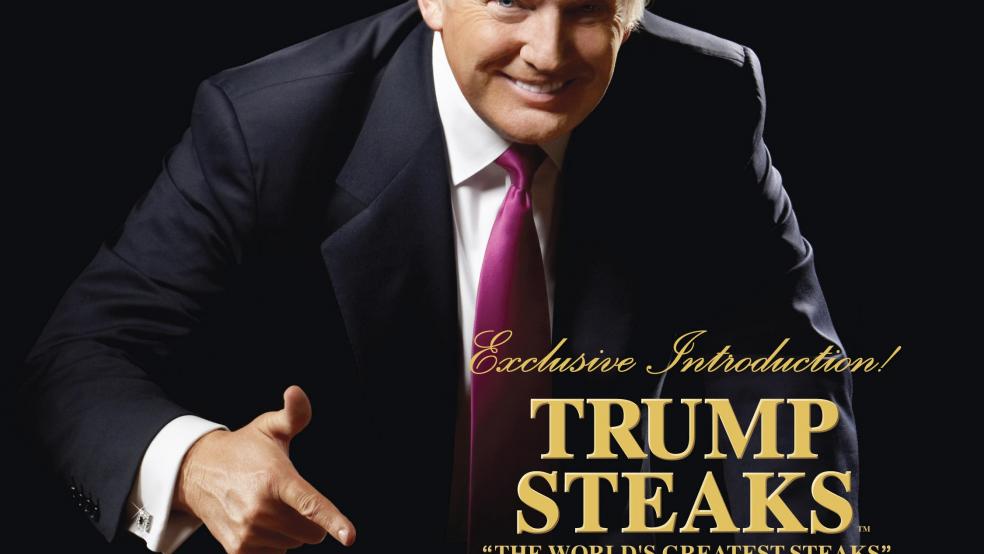Other companies in that vicinity are MTV ($3.42 billion), Chipotle ($3.38 billion) and Fanta ($3.32 billion). Halliburton, the oilfield services company once run by Dick Cheney and made famous by its government contracts during the Iraq War, was also valued at $3.32 billion.
The question of Trump's valuation has long dogged him and his campaign. Trump himself is immensely concerned with the appearance of wealth according to a number of acquaintances, including Tony Schwartz, the ghostwriter on his 1987 book "The Art of the Deal."
Related: Can Donald Trump Save the Republican Convention?
"Of course he's in it for the money," Schwartz told The New Yorker magazine. "One of the most deep and basic needs he has is to prove that 'I'm richer than you.'" (Emphasis theirs.)
Forbes recently estimated his total net worth at $4.5 billion, a figure Trump roundly rejects, largely because of his brand.
"[The people at Forbes] don't know a lot of the things I own," Trump told CNBC's John Harwood. "I don't think they give me value for brand and my brand is very valuable."
The Trump campaign did not respond to a request for comment for this story.
Estimating brand value
Because brands are intangible assets belonging to individuals and companies, there's a lot of disagreement on how to estimate brand valuation. Most experts use an "income approach" which estimates how much a brand will be worth going forward, depending on potential future income.
Related: ‘Art of the Deal’ Co-Author: Trump Could Destroy Civilization
Within the income approach, there are two main methods to model the intangible value of a brand: excess earnings and royalty relief.
Excess earnings estimates the future potential revenue and profits from a given asset, "less the portion of those profits attributable to other assets that contribute to the generation of cash flows," according to professional services firm PricewaterhouseCoopers.
The royalty relief method estimates how much the company (or person) would be willing to pay to use the brand itself, if it didn't own it already. That is, what the owner could save on royalties associated with brand licensing. Brand Finance uses a royalty-relief approach, which it describes as "estimating the likely future sales attributable to a brand and calculating the royalty rate that would be charged for the use of the brand."
It's unclear how Trump arrived at the $3.32 billion estimate, but that's higher than the $3 billion that was estimated in 2010 reportedly by consulting firm Predictiv, according to a contemporaneous disclosure form. The company's website describes its method as "a combination of quantitative and qualitative techniques" to measure intangible value.
Related: Cleveland Protests Turn Violent as Trump Receives GOP Nomination
Predictiv did not respond to a request for more information on its methods or whether it still works with Trump.
Bloomberg recently gave Trump's brand a value around $35 million, which is "one times sales from ongoing licensing deals." Trump's own estimate of $3.32 billion would represent a sales multiple around 100. That's far higher than the highest price-to-sales ratio for an S&P 500 company, Bloomberg reported.
The strength of Trump's brand is not limited to projects that the billionaire throws his actual weight behind.
The Trump name is often sold to real estate development projects he has nothing to do with, but can simply lend an air of authority and opulence.
The Los Angeles Times recently ran a story detailing the failed Trump Ocean Resort project in Baja California, Mexico, and a cadre of condo buyers who had sued Trump over the project. Despite promotional materials featuring Trump, it turned out he was not involved in the deal at all; the Trump family had simply sold its name to the developers.
The story called it part of a "long trail of angry customers and vendors who accused him in court of cheating them." The Trumps settled the suit, the terms of which are confidential, according to the newspaper.
Trump's likely Democratic opponent for the White House, Hillary Clinton, has spent her life in government rather than the private sector, and has not released estimates of the Clinton brand value.
This article originally appeared in CNBC. Read more from CNBC:
Real estate stocks let you ‘have your cake and REIT it, too’: Analyst
GOP plan to bring back Glass-Steagall is dumb policy and dumb politics




